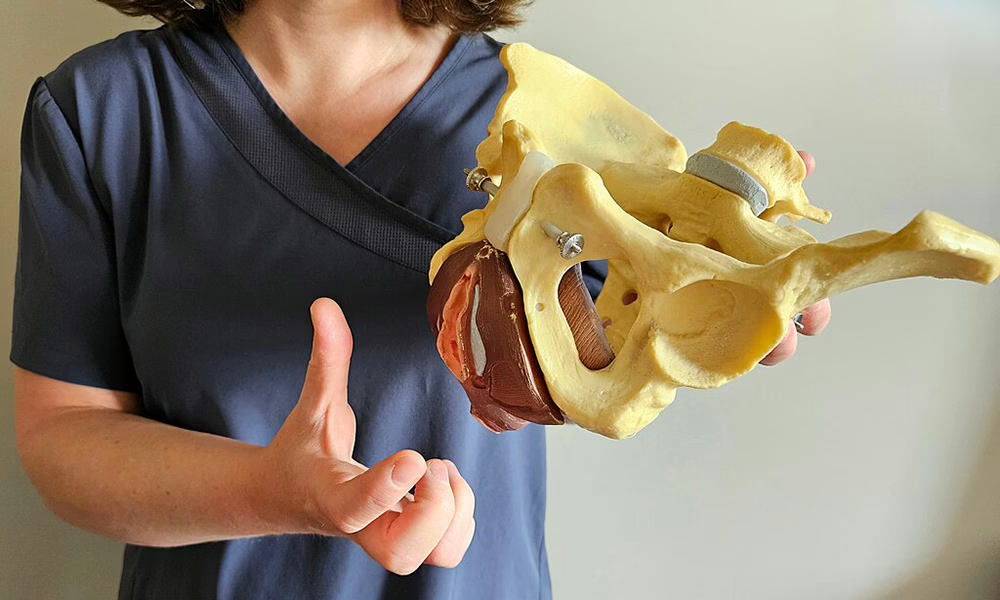Pelvic Congestion Syndrome (PCS) is a condition that affects many individuals, causing chronic pelvic pain and discomfort. At Monterey Bay Vascular, we aim to provide comprehensive information about PCS, its causes, symptoms, diagnosis, and treatment options. We aim to provide useful information to help you understand this condition and find ways to manage its symptoms.
What is Pelvic Congestion Syndrome?
Pelvic Congestion Syndrome (PCS) is a medical condition characterized by varicose veins in the pelvic region. These blood vessels become enlarged and swollen, leading to chronic pain and discomfort. Risk factors include hormonal changes, particularly during menstrual cycles between 20 and 45. Symptoms, including long periods and pain associated with PCS, can be distressing.
Ovarian vein embolization or testicular vein embolization is a potential treatment option, often recommended after a CT or MRI scan confirms vein dilatation. While PCS affects both women and men, it is more commonly encountered in women.
Causes of Pelvic Congestion Syndrome
The exact cause of PCS is not always clear, but several factors may contribute to its development:
• Venous insufficiency: Happens when vein valves don’t work well, causing blood to gather and veins to get bigger.
• Hormonal changes: Like during pregnancy or with birth control, can weaken vein walls and cause PCS.
• Genetic Predisposition: Some individuals may have a genetic predisposition to developing varicose veins, increasing their risk of PCS.
Symptoms of Pelvic Congestion Syndrome
PCS can manifest with various symptoms, which may include:
• Chronic pelvic pain, often described as a dull, aching sensation.
• Increased discomfort after prolonged sitting or standing.
• Painful intercourse.
• Irregular menstrual periods.
• Backache or leg pain.
• Pelvic pressure or fullness.
It’s important to note that the severity of symptoms can vary from person to person.
Diagnosis
Diagnosing PCS is difficult because symptoms can be similar to other conditions. Diagnostic methods may encompass:
• Pelvic Ultrasound: A pelvic ultrasound can detect enlarged veins in the pelvic area.
• CT or MRI Scans: These imaging techniques can provide detailed images of the pelvic region, aiding in the diagnosis.
• Venography: In some cases, a contrast dye is injected into the pelvic veins to visualize blood flow and identify congestion
Treatment Options
Treating Pelvic Congestion Syndrome involves various methods based on the person’s needs and symptoms. Common options include:
• Conservative Management: Lifestyle changes, such as regular exercise and wearing compression stockings, can help alleviate symptoms.
• Medications: Non-steroidal anti-inflammatory drugs (NSAIDs) may be prescribed to manage pain and discomfort.
• Embolization: This minimally invasive procedure involves blocking off the enlarged pelvic veins, reducing pain and pressure. In women, the physician embolizes the ovarian vein (also known as the gonadal vein) and in men the testicular vein.
Conclusion
Pelvic Congestion Syndrome is a difficult condition that can greatly affect someone’s life. But individuals can manage its symptoms well with the right knowledge and medical help.
At montereybayvascular.com, we provide reliable information on PCS and its treatments. We hope this article has been helpful in your journey to understand and manage Pelvic Congestion Syndrome. Remember, it’s important to seek professional medical advice for an accurate diagnosis and personalized treatment plan. If you think you have Pelvic Congestion Syndrome, consult a healthcare provider and schedule an appointment with MBV today!
FAQs
Is Pelvic Congestion Syndrome common?
PCS is less common but can impact both genders.
Is PCS a hereditary condition?
PCS can develop in people without a family history, even though genetics may play a role.
Can treatment completely cure PCS?
While treatment can help manage symptoms, it may not completely cure PCS in all cases.
How can I find a specialist for PCS treatment?
To find a specialist, ask your doctor or gynecologist to recommend a healthcare provider who knows how to treat PCS.
